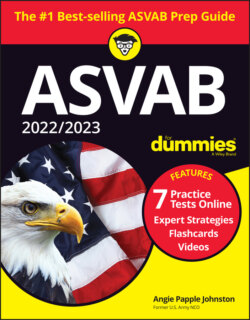Читать книгу 2022 / 2023 ASVAB For Dummies - Angie Papple Johnston - Страница 86
Finding a topic sentence
ОглавлениеOften, the author begins or ends a paragraph or passage with the main idea, which is located in what’s called a topic sentence. A topic sentence, reasonably enough, describes the topic that the author is writing about.
If you’re looking for the main idea, start off by checking the first and last sentences of the passage. (No, this doesn’t mean that you should skip the rest of the passage.) For example, suppose you read the following paragraph:
The local school district is facing a serious budgetary crisis. The state, suffering a revenue shortfall of more than $600 million, has cut funding to the district by $18.7 million. Already, 65 teachers have been laid off, and more layoffs are expected.
No, the primary theme of this passage isn’t “schools in our area suck.” The main point of this paragraph can be found in the opening sentence, “The local school district is facing a serious budgetary crisis.” What follows are details regarding the budget crisis.
Sometimes a passage builds up to its main idea, and sometimes the main idea is implied instead of stated. Consider the following paragraph:
The farmers’ market reopened on the second weekend of May. Amid the asparagus and flowers, shoppers chatted about the return of temperatures in the 70s. Across the street, children (and their dogs) played Frisbee in the park. Finally, spring has come to town.
In this paragraph, you may think that the farmers’ market’s reopening is the main point, but the other information about the temperature and the kids playing Frisbee tells you that the main idea is something a bit broader than the market’s opening. The main idea is stated in the last sentence: “Finally, spring has come to town.”
In boot camp, your drill instructor may say, “Some of you better check to see that your bunks are properly made.” Or they may rip your bunk bed apart and say, “Now make this bunk the right way!” Both comments mean the same thing. In the first statement, the drill instructor implies the meaning (and you’d better go check your bunk); the second statement is a bit more direct.
